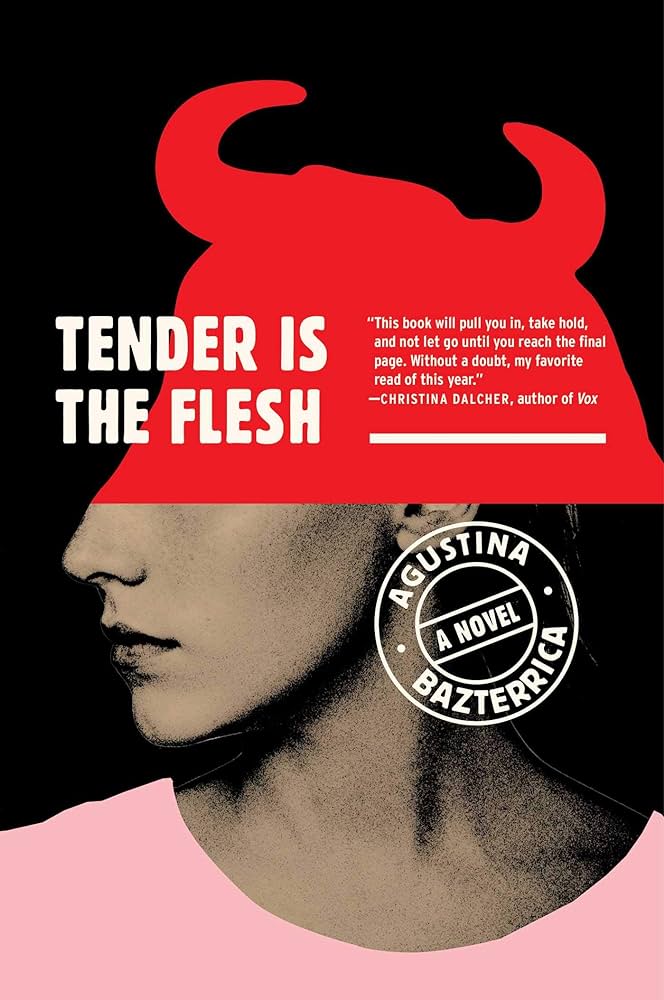| Overall Rating: ★★★★☆
In 1729, Dr. Jonathan Swift wrote and published A Modest Proposal, his most well-known work, which was intended to be a satirical piece that included social commentary on the poor economic statues of Ireland in the 1700s. In his piece, Swift proposes a solution to the misery of the people: sell the children of the poor into a meat market for the rich, as this would provide money for the poor families and combat overpopulation. Indeed, Swift goes into great detail when describing this proposal: “… A young healthy child well nursed, is, at a year old, a most delicious nourishing and wholesome food, whether stewed, roasted, baked, or boiled; and I make no doubt that it will equally serve in a fricasee, or a ragoust.” His line is an apt epigraph for Agustina Bazterrica’s novel, Tender is the Flesh, which was published in 2017. This dystopian horror novel is one that mirrors Swift’s proposal, with one major difference: cannibalism is industrialized for the pure pleasure of eating meat.
“Carcass. Cut in half. Stunner. Slaughter line. Spray wash.” The opening line of this novel immediately hooks the reader in, chilling them to their bone. The author goes on to explain a world where a virus has infected all animals, rendering them inedible and requiring the culling of domesticated and wild animals. To fulfill the carnivorous parts of the human diet, the government initiates the “Transition:” a new system of breeding “head” and sending them to slaughterhouses, where every part is harvested for consumption. The novel focuses on a man named Marcos, whose life is centered around grief and slaughter. His wife has left him after the death of his stillborn child, and his father, who lives in a nursing home, is sinking into dementia. He is constantly haunted by thoughts of how he makes his living: working at a human processing plant, witnessing the brutal murder of human beings day after day. One day, Marcos is given a gift: a live specimen of the highest quality. Through the course of many chapters, Marcos starts to treat her as a human being, and is ultimately torn apart between morality and society.
This book contains heavy, violent, and near-constant depictions of gore, with a few depictions of sexual assault, making it a heavy read. Indeed, I had to put the novel down and take a break many times.
While the novel goes into detail on the slaughtering process, it has much more to offer than just gore. Something Marcos spends the entirety of the novel talking about is the power of words in this dystopian society. The novel’s main point is that when all social norms collapse, humans can be capable of unspeakable things if they have the right words to comfort themselves. For example, humans are referred to as “special meat,” products, or simply as food. The normalization of cannibalism is now referred to as the Transition. Euphemisms have allowed society to normalize breeding humans like animals, sending them to butcher shops, and hunting them on game reserves. Words protect the population from the guilt of their actions. Words empower the government, allowing the government to wield them to their advantages. Words are used to rationalize, to provide explanations. Our actions may be revolting and atrocious, but words allow us to justify them. Words have allowed people to enter a new reality, to construct a world where anything is acceptable.
This book has landed high in my list of favorite dystopian novels. The gore was sometimes simply excessive to the extent that it was only to further points already made by the author, contributing to my rating of four stars. However, the novel forced me to get comfortable with the uncomfortable. I found that, as I kept reading, I became more and more used to words such as “special meat,” “breeding centers,” “processing plants,” and less aware of words such as “atrocity” and “sadism.” While the novel’s aim is certainly not to promote veganism, I find myself much more aware of the atrocities of the meat industry. As the novel progresses, Marco becomes increasingly more conflicted; how should he treat this gifted specimen, a human being, in a way that is humane yet in accordance with societal norms? The ending of the novel and Marco’s final decision is one that left me stunned and offered many questions for me that I continue to think about. This novel is not for the light-hearted, as aforementioned, as it contains heavy depictions of gore and sexual crimes. Additionally, Tender is the Flesh will be most enjoyed by avid horror readers or those who enjoy works with social and public criticism and commentary. This spine-chilling novel is one that will stay with me through many nights to come, and I encourage all that are brave enough to read it.



